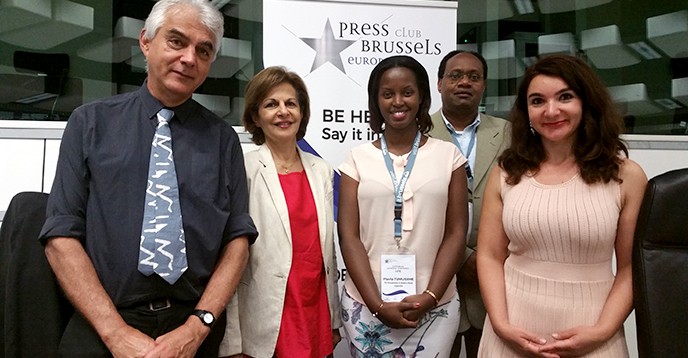UNESCO participates in International Association of Press Clubs
Berger cited a UNESCO study that states the democratic role of media is key to good governance and accountability.

- Country:
- Belgium
“Organize dialogues on contemporary key issues,” was UNESCO’s message to delegates from some 40 countries attending the general assembly of the International Association of Press Clubs that took place on Friday 1 June 2018 in Brussels, Belgium.
“Through organizing debates with governments, advertisers and media owners, press clubs can convince them to recognize the contribution that journalism can make to good governance and sustainable development,” said Guy Berger, UNESCO’s director for Freedom of Expression and Media Development.
He spoke on a panel titled, “The role of media and business in advancing Good Governance,” along with Ernest Sagaga of the International Federation of Journalists, Ugandan broadcast journalist Flavia Tumusiime, and Shada Islam of Friends of Europe. It was chaired by Erisa Zykaj, correspondent of ABC News.
Berger cited a UNESCO study that states the democratic role of media is key to good governance and accountability, noting that this a role is often thwarted in varying extents.
“Press clubs can be a site for dialogue and debate to promote understanding and action towards free, pluralistic and independent media, as well as safety for journalists,” he said.
“The rule of law is key to good governance, and we have to convince everyone that it is a sign of no rule of law more broadly when attacks on journalists go unpunished. Impunity for these attacks means there is no security or predictability for anyone, including investors,” said the UNESCO director.
He urged press clubs worldwide to commemorate the UN-recognised International Day to End Impunity for Crimes against Journalists each 2 November.
Flavia Tumusiime told of a woman colleague who had withdrawn from journalism after being abducted and beaten. “What does that say to me as a colleague who used to sit next to her? What does it say to the public that she was taken, beaten and is not on air anymore?”
Shada Islam told the meeting that it was not a coincidence that populist figures around the world were describing media as a public enemy, but said that some media platforms had given undue publicity enabling these elements to come to power and by fueling hatemongering.
In his remarks, Berger also put emphasis on press clubs observing UNESCO’s International Day for Universal Access to Information, held each 28 September.
“This Day dovetails with the Sustainable Development Goals – SDGs,” he said. He pointed specifically to SDG 16 which highlights the objective of societies achieving peace, justice and strong institutions, and the related target of “public access to information and fundamental freedoms”.
“Goal 16 shows the importance of good governance as a key factor in efforts towards sustainable development, as well as points us to the role that of a free press in making information available to the public,” said Berger.
“Every country has agreed on these SDGs, and press clubs should dialogue with governments about what they are doing to make progress on sustainable development including how they treat SDG 16.10.”
“Just as a court case without facts cannot make a fair judgement, so dialogue can make the point that everyone needs journalism if they want to have verifiable information in the public interest.
“In the face of what some people today call ‘information disorder’, press clubs can point out that independent and professionalism journalism is a defence against rumour and disinformation,” Berger stated. He also called for press clubs to engage public relations practitioners in order to promote ethics in the face of an industry that had emerged to distribute disinformation.
During the debate, Ernest Sagaga highlighted as threat to good governance the problem of “fake news” which he described as information that is not true and is designed to mislead and confuse.
Berger said that discussions with media owners and advertisers were needed to convince these stakeholders that respecting editorial independence is key to credibility and the only route to news media gaining trust, respect, influence and business success. He referenced related work that UNESCO does in South East Europe and Turkey.
Supported by the European Commission, the event was organized by Laurent Brihay, Executive Director of the Press Club Brussels Europe, which holds the Presidency of the International Association Press Clubs.
- READ MORE ON:
- UNESCO
- International Association of Press Clubs
- Goal 16
- Good Governance
ALSO READ
UNESCO emphasizes crucial role of STI in driving socio-economic progress
UNESCO, Lukenya University plant 10,000 trees in Amboseli's Biosphere Reserve
UNESCO, UNDP, BAZ, and Transmedia support community resilience in Zimbabwe
UNESCO discusses reshaping Sudan's education landscape amid current emergency
UNESCO needed to work towards protecting Sudanese heritage amid a year of conflict










